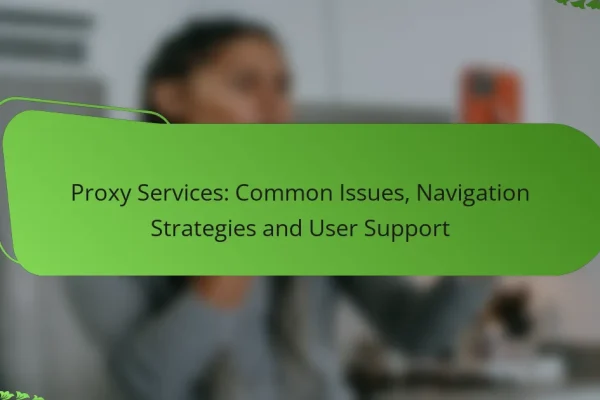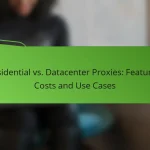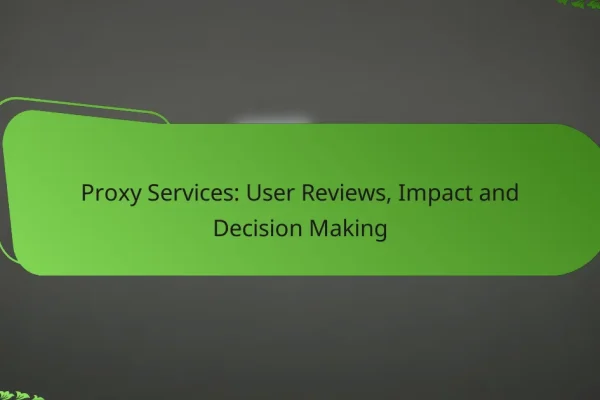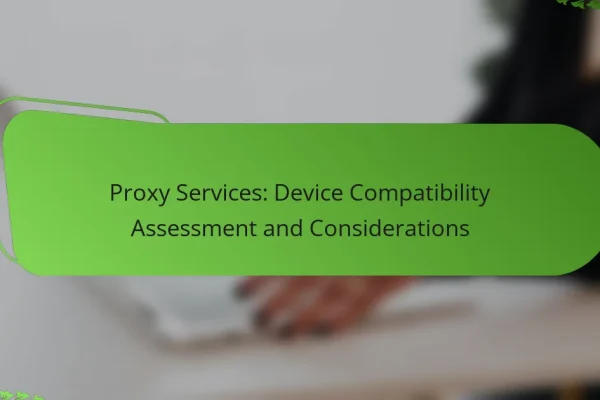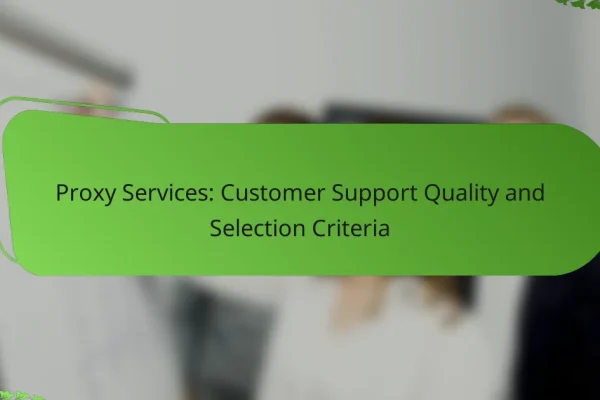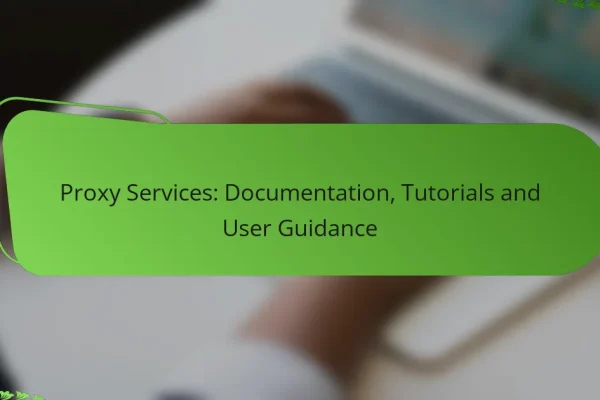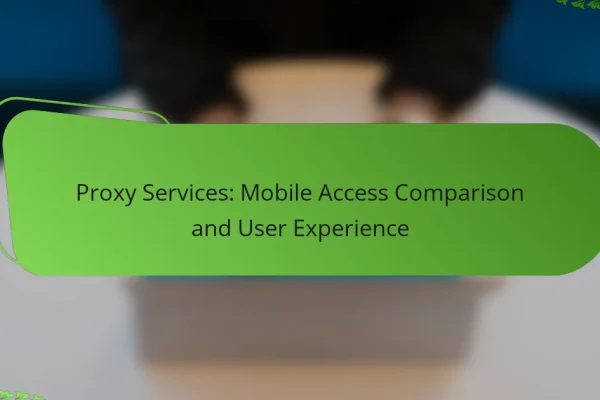How do proxy services enhance user experience?
Proxy services enhance user experience by improving browsing speed, providing access to geo-restricted content, and increasing privacy and security. They act as intermediaries between users and the internet, optimizing data flow and enabling access to a wider range of online resources.
Improved browsing speed
Proxy services can significantly enhance browsing speed by caching frequently accessed content. When a user requests a webpage, the proxy can deliver it from its cache rather than fetching it from the original server, reducing load times. This is particularly beneficial for users in regions with slower internet connections.
Additionally, proxies can compress data before sending it to the user, further speeding up the browsing experience. Users may notice faster page loads and smoother streaming, especially when using proxies designed for high-performance tasks.
Access to geo-restricted content
Many online services restrict access based on geographic location. Proxy services allow users to bypass these restrictions by masking their IP addresses and appearing as if they are accessing the internet from a different location. This enables access to content such as streaming services, websites, and applications that may not be available in a user’s region.
For example, a user in Europe can use a proxy server located in the United States to access American streaming platforms. However, users should be aware of the legal implications and terms of service of the content they are accessing through proxies.
Enhanced privacy and security
Using a proxy service can enhance user privacy by hiding the user’s IP address from websites and online trackers. This anonymity helps protect personal information and browsing habits from being monitored. Proxies can also encrypt data transmitted between the user and the proxy server, adding an extra layer of security.
However, not all proxy services offer the same level of security. Users should choose reputable providers that implement strong encryption protocols and have clear privacy policies. Avoid free proxies, as they may compromise user data or inject ads into web traffic.
What are the best proxy services for user experience?
The best proxy services for user experience prioritize speed, reliability, and ease of use. Key players in this space include Bright Data, Smartproxy, and Oxylabs, each offering distinct features and benefits tailored to different user needs.
Bright Data (formerly Luminati)
Bright Data is known for its extensive network of residential IPs, which enhances anonymity and bypasses geo-restrictions effectively. Users can access over 72 million IP addresses globally, making it suitable for web scraping, market research, and ad verification.
When using Bright Data, consider its pricing structure, which can be on the higher side compared to competitors. However, the quality of service and customer support often justifies the investment, especially for businesses requiring reliable data extraction.
Smartproxy
Smartproxy offers a user-friendly interface and a robust network of over 40 million residential IPs. It is particularly favored by small to medium-sized businesses for its balance of affordability and performance.
This service allows users to rotate IPs easily, which is crucial for tasks like web scraping and social media management. Smartproxy’s pricing is competitive, with plans that cater to various usage levels, making it accessible for different budgets.
Oxylabs
Oxylabs provides a large pool of residential and datacenter proxies, with a focus on high-speed connections. Its services are ideal for enterprises needing large-scale data collection and web scraping solutions.
While Oxylabs is more expensive than some alternatives, it offers features like dedicated account managers and advanced scraping tools, which can enhance user experience significantly. Users should evaluate their specific needs against the cost to determine if Oxylabs is the right fit for them.
How to choose the right proxy service?
Choosing the right proxy service involves evaluating several key factors, including speed, reliability, customer support, and pricing plans. These elements will help ensure that the service meets your specific needs, whether for personal use or business applications.
Evaluate speed and reliability
Speed and reliability are crucial when selecting a proxy service. Look for providers that offer low latency and high uptime, ideally above 99%. A good proxy should not significantly slow down your internet connection.
Consider testing the service with a free trial or money-back guarantee to assess its performance. Many reputable providers allow users to check speeds in real-time, which can help you make an informed decision.
Check for customer support
Reliable customer support is essential for resolving issues quickly. Look for proxy services that offer 24/7 support through multiple channels, such as live chat, email, or phone. This ensures you can get help whenever you encounter problems.
Read reviews and testimonials to gauge the quality of customer service. A responsive support team can save you time and frustration, especially if you rely on the proxy for critical tasks.
Consider pricing plans
Pricing plans can vary widely among proxy services, so it’s important to compare options. Look for services that offer flexible plans based on your usage needs, whether you require a few proxies or a large number for extensive operations.
Be wary of hidden fees and ensure that the pricing structure is transparent. Some providers may offer discounts for longer commitments, while others might have pay-as-you-go options that could be more economical for occasional use.
What are the common use cases for proxy services?
Proxy services are commonly used for various purposes, including web scraping, market research, and ad verification. Each use case leverages the ability of proxies to mask IP addresses and bypass restrictions, enabling users to gather data or conduct activities more efficiently.
Web scraping
Web scraping involves extracting data from websites, and proxy services play a crucial role in this process. By using proxies, businesses can avoid IP bans and access large volumes of data without being detected. It’s essential to rotate proxies frequently to maintain anonymity and ensure a smooth scraping experience.
When engaging in web scraping, consider the legal implications and the terms of service of the websites you target. Some sites may have strict policies against scraping, so it’s wise to review these guidelines beforehand.
Market research
Market research often requires gathering competitive intelligence and consumer insights, which can be effectively achieved using proxy services. Proxies allow researchers to access region-specific content and analyze competitor pricing, product offerings, and customer feedback without revealing their identity.
For effective market research, utilize proxies that provide access to various geographic locations. This enables a broader understanding of market trends and consumer behavior across different regions.
Ad verification
Ad verification ensures that advertisements are displayed correctly and reach the intended audience. Proxy services help advertisers check if their ads are appearing as planned across different platforms and regions. This is particularly important for maintaining brand integrity and optimizing ad spend.
To maximize the effectiveness of ad verification, use proxies that can simulate user behavior in various locations. This allows for accurate assessments of ad placements and helps identify any discrepancies in ad delivery or performance.
What are the limitations of using proxy services?
Proxy services offer various benefits, but they come with significant limitations that users should be aware of. Understanding these drawbacks can help in making informed decisions about their use.
Potential for IP bans
One major limitation of using proxy services is the potential for IP bans. Many websites monitor traffic and can identify suspicious activity, leading to the blocking of IP addresses associated with proxies. This is particularly common with free or shared proxies, where multiple users share the same IP.
To mitigate this risk, consider using dedicated or residential proxies, which are less likely to be flagged. Regularly rotating IP addresses can also help maintain access to targeted sites.
Latency issues
Latency is another limitation when using proxy services. Proxies can introduce delays in data transmission, resulting in slower internet speeds. This is especially noticeable with high-latency proxies that may add several hundred milliseconds to response times.
Choosing a high-quality proxy provider with optimized servers can help reduce latency. Testing different proxies for speed before committing to a service can also be beneficial.
Legal and ethical concerns
Using proxy services can raise legal and ethical issues, particularly regarding data privacy and compliance with local laws. Some jurisdictions have strict regulations about data scraping or accessing geo-restricted content, which can lead to legal repercussions.
Always research the legal implications of using proxies in your region. Ensure that your activities comply with the terms of service of the websites you access, and consider the ethical implications of your actions to avoid potential backlash.
How do proxy services integrate with SaaS tools?
Proxy services enhance the functionality of Software as a Service (SaaS) tools by providing secure, anonymous access to the internet. They facilitate data scraping, improve performance, and help manage user privacy while using various SaaS applications.
Benefits of using proxies with SaaS tools
Integrating proxies with SaaS tools offers several advantages. They enable users to bypass geographical restrictions, access content that may be blocked in certain regions, and maintain anonymity while performing online tasks. This is particularly useful for businesses that operate in multiple countries.
Additionally, proxies can improve the speed and reliability of data transfers. By routing requests through a proxy server, users can reduce latency and enhance the performance of SaaS applications, especially when dealing with large datasets.
Considerations when choosing a proxy service
When selecting a proxy service for SaaS integration, consider factors such as speed, reliability, and security. Look for providers that offer high uptime rates and fast connection speeds to ensure seamless operation with your SaaS tools.
It’s also important to evaluate the type of proxy you need. Residential proxies are often more reliable for accessing localized content, while data center proxies can provide faster speeds for bulk data tasks. Assess your specific requirements to make an informed choice.
Common pitfalls to avoid
One common pitfall is choosing a proxy service solely based on cost. While budget is important, opting for the cheapest option can lead to poor performance and security risks. Prioritize quality and reputation over price.
Another mistake is failing to test the proxy with your specific SaaS tools before full implementation. Conducting a trial run can help identify any compatibility issues and ensure that the integration meets your expectations.
